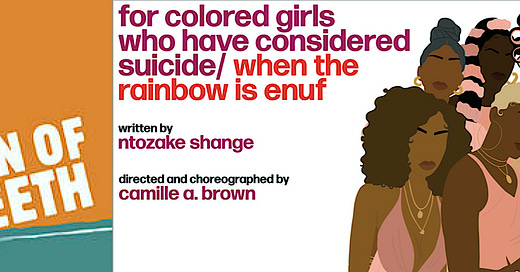I saw two post-apocalyptic plays on Broadway recently in a span of 24 hours. In a matter of weeks, Tony Award nominations notwithstanding, they will both be gone. I'm glad I managed to catch them; privileged even. I'm sad, though, that they will not survive.
Only one of these extraordinary pieces has been called post-apocalyptic before: The Skin of Our Teeth, which opened in an expansive revival at Lincoln Center Theater's capacious Vivian Beaumont Theater, but only fully occupied that theater's notoriously hard to fill thrust stage the night I saw it; the house itself was less than half-full. Post-apocalyptic indeed.
for colored girls who have considered suicide/when the rainbow is enuff, Ntozake Shange's incandescent "choreopoem," meant many things to me when I first caught it at the Booth Theatre during its premiere Broadway run in 1977. (I wrote here previously about the show's instant impact on me, my immediate quest for more of Ms. Shange's work, and the lifelong friendships that ensued.) What floored me in its current revival (at the very same Booth Theatre) was the realization that for colored girls is actually a post-apocalyptic play too. Its five "Ladies" in their rainbow-hued dresses have each survived their own private apocalypses with men, and have emerged, triumphantly dancing and singing, to tell us about it.
This sense of survival permeates both plays with a radiance that puts our present post-apocalyptic moment to shame. A sense of shared purpose and responsibility for one another is the source of post-apocalyptic survival in each piece — centered around the family in The Skin of Our Teeth; around a sisterhood in for colored girls. Self-centered "rights" to all kinds of facile, self-absorbed "liberties" that endanger the survival of the community — like refusing vaccination, or ripping off one's mask in the middle of a worldwide pandemic — well, that kind of "liberty" has no place in these two plays. Yet, both are very much about freedom.
Written just as World War II hit America, opening on Broadway less than a year after Pearl Harbor, in November 1942, The Skin of Our Teeth won a Pulitzer Prize and is in every way legendary as a work of luridly comic post-apocalyptic imagination, by the stealth magical realist of 20th Century American theater, Thornton Wilder, author of Our Town and a passel more. Most of what I've ever read about The Skin of Our Teeth (including recently) has dwelt in over-long explications of the play's eons-encompassing, time-traveling funhouse, three-hour plot. The show is a bear to summarize (or a blast, depending on your state of intoxication). Go see it before it closes at the end of this month and then kick it around yourself — as every audience member before you has done, going back to the dawn, not of time (which The Skin of Our Teeth more than kicks around), but the dawn of World War II's cataclysmic horrors, right on up to our own.
The timely anchor that Lincoln Center Theater and director Lileana Blain-Cruz have given The Skin of Our Teeth is to cast its protagonists, the All-American Antrobus family, plus their maid, Sabina, with actors of color. A sense of entitlement has always carried the Antrobuses through the existential trials and tribulations of The Skin of Our Teeth. This has always distanced them, for me, just a little. The fact that the Antrobuses here are African Americans endows their slightly privileged sense of prerogative with a racial can-do inclusive optimism that feels far more legitimately All-American. Nothing heavy-handed or preachy about this re-racialization. It just is.
for colored girls has always been about those glorious young "Ladies" of vari-colors. This has not changed. The new production has been eloquently injected with even more movement than the original by its marvelous director/choreographer Camille A. Brown, but, in the end, it is Ms. Shange's poetry that sustains. It has proven timeless.
How do we all survive, together? Each of these plays asks the same question, ultimately. If, like me, you have no idea any more what the answer to that question is, you might want to console yourself with those proposed by these two post-apocalyptic masterpieces. Like so much that seems important these days, they are sadly fleeting.




